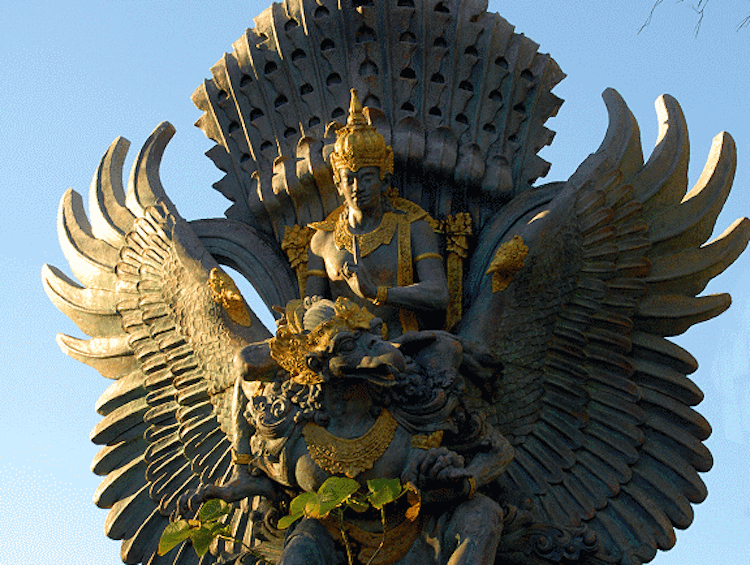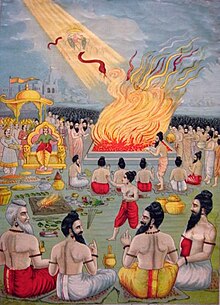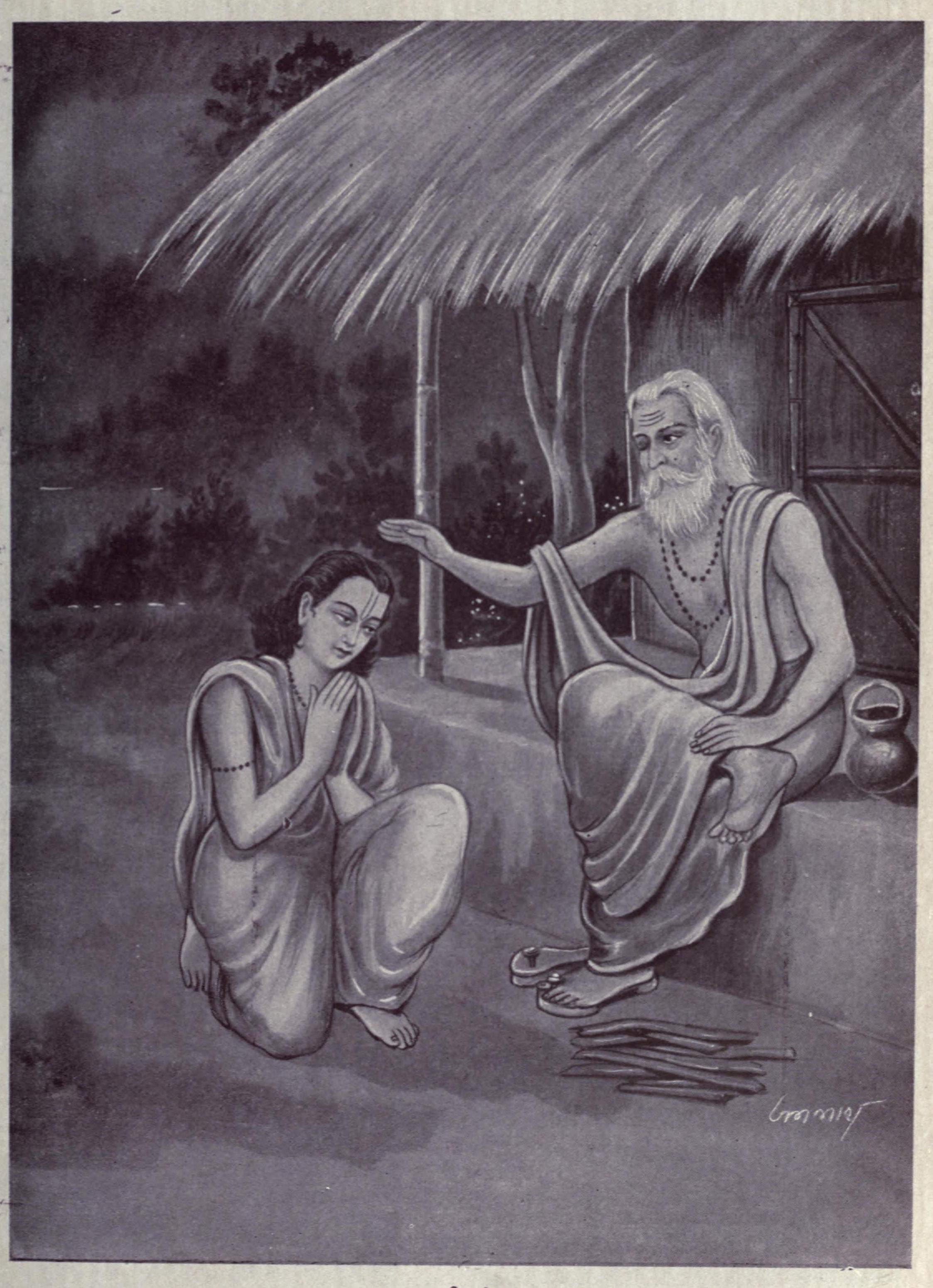As one may expect, it's very weird. It's dense, old, and full of elements you would expect in a gonzo game. To that end, I've been going back through my annotations of the Smith translation (a heavily abridged version, occupying a merciful 800 pages, of which I have only read about 300). I planned to take the weirdest parts of it, copy them here and make some gameable material out of them. It quickly became clear that such a post would be much too long, and I instead resolved to split it into parts.
Here's my selections from the first thirty pages (most of them summary) of the Mahabharata, and some gameables to go along with it. I have no doubt you'll find something in here that gets you thinking.

Spells:
Multitude of Mouths (pg. 6)
R: touch T: self or creature D: 1 hour
The target creature assumes a multitude of mouths. [Sum] mouths open on their torso, legs, arms, face, etc. The mouths can be hidden by closing them, and they appear as wrinkles. The mouths can be used to temporarily hold [sum] items as quick slots, being swallowed and vomited up from a pocket dimension at will. If in unarmed combat, you deal +[sum] extra damage as the mouths bite and tear. Items held when the spell ends are forcibly expelled from your mouth. Creatures that see the mouths suffer -[dice] to Reaction and Morale rolls.
Protection from Snakes (pg. 10)
R: 0 T: self D: concentration
So long as you chant the legend of the great hero who rescued the King of Snakes from sacrifice, you are protected from all snakes. They may not attack you, and if you have already been bitten, the effects of their venom are stalled so long as the spell continues. You can move around fight, but can't say anything else or hold your breath.
Born in the Bottle (pg. 25)
R: 0 T: recent corpse and creature D: 1 minute
Burn a recent corpse and mix the ashes into hard liquor. The creature that drinks it becomes a conduit for the dead for a minute. 1MD: Can answer questions, is able to resist. 2: Can answer questions, can be forced to answer with a Wisdom check from the host. 3: Can answer questions, must be truthful. 4: Can be bodily reborn by bursting from the host's stomach. Will kill the host.
Locations:
A vault of gems in the deep ocean or deep in Mount Himalaya (pg. 12).
River that flows through and under a gap in a mountain. Legends claim it was created by the kick of a mighty hero (pg. 14).
Encounters and Hooks:
By the sea, a terrible, colossal elephant rages and stampedes. In the water, a colossal turtle mocks it. These are two wizards who have been permanently polymorphed into their new forms, though they can still speak. Both will pay you handsomely to free them but not the other (pg. 6).
The sun has stopped setting. Whether it's just here or all over the world, the sun has been low in the sky for a week now. The local legends say that a great sage on the mountain refuses to allow the sun to set while he sleeps, and has been taking a very long nap (pg. 9).
While passing by a river, you find a beached fish, its belly swollen, babies' cries coming from inside. There are two human infants, the misbegotten children of a local ruler, who will very much want to keep them a secret (pg. 15).
The party comes across a woman at a body of water, drowning several crying babies in turn. These babies are incarnated spirits the woman has agreed to free. The party doesn't know that, the woman must keep it secret (pg. 28).
Quotes
Smith pg. 4: The Raksasa Puloman schemed with Fire to abduct Puloma', wife of Bhrgu. When this happened, Puloma's baby 'fell from her womb and Puloman turned to ash.'
"Fire is the mouth through which gods and ancestors receive the oblations offered to them."
Smith pg. 6: "Kasyapa relates the story of two ascetic brothers who quarreled and cursed each other; one now lives as a colossal elephant the other as a colossal turtle. Garuda [a giant divine bird] should eat them."
Smith pg. 7: Garuda "assumes a multitude of mouths and fetches water from the rivers [to put out the sacred fire].'
 |
| Garuda, who later becomes the friend and mount of Indra. |
Smith pg. 8: Taksaka (king of snakes) 'bites a tree, which immediately burns away into ashes.'
Smith pg. 9: [Jaratkaru is a powerful ascetic who has vowed to only marry a woman with the same name as him]. "When [Jaratkaru] learned from Vasuki that she has the right name, [he] wedded Jaratkaru the snake woman; however, he stipulates that he will leave her if she ever displeases him in act or word. In the course of time she conceives. Not long afterwards, her husband lies sleeping while the sun sinks in the sky; fearing that he will fail to perform the evening rituals, she wakes him, after much hesitation. He is angry at being disturbed unnecessarily; the sun does not have sufficient power to set while he is asleep. Despite her pleas, he leaves her."
[Note: This is a repeated theme of the text. Many mortals, especially seers, are actually more powerful than the gods, capable of cursing and binding them.]
Smith pg. 10: [Astika saves Taksaka from being sacrificed.] "He calls to him, 'Stay!' and the snake remains suspended in mid-air over the flames." ... "The snakes are delighted with him and offer him a boon; he chooses that anyone who recites his story shall be invulnerable to snakes."

Smith pg. 12: "The blessed ocean and Mount Himalaya are both considered treasuries of gems, and the Bharata is reckoned so too."
Smith pg. 14: "The river Suktimati flowed by [the noble king Vasu's] city. The story goes that Mount Kolahala, the living mountain, had once blocked her way, full of desire for her; Vasu kicked Mount Kolahala, and now the river flowed through the gap caused by his kick. But the mountain has already begotten twin children by that river; delighted at her release, the river presented them to the king. One was a son: Vasu, truest of royal seers and bestower of wealth, appointed him his foe-taming general. The other, a daughter names Girika, or 'Mountain Girl,' the king took for his beloved wife."

Smith pg. 15: [Vasu is directed by his ancestors to hunt deer while Girika's 'seasonal time' has come for bearing a son.] "... King Vasu set off to hunt, full of desire, his mind full of nothing but Girika, supremely lovely like a second Sri in bodily form; and as he traveled through the beautiful forest, his seed gushed forth. At once the king caught that seed on a leaf from a tree, for he was anxious that it should not be spilt for nought..." [Vasu consecrates it with mantras and gives it to a hawk to carry to Girika, who is attacked by another hawk, and the seed falls into the river.] "Now in the River Yamuna there lived a beautiful Apsaras[goddess] named Adrika, who had been cursed by Brahma to become a fish; and in her fish form, Adrika swiftly approached the seed... and swallowed it." [Nine months later, that fish is caught, two human children are drawn from her belly, who are brought to Vasu.] "Then King Vasu Upicara took the boy; he was to become the righteous King Mastya, true to his vows."
[Note: Matsya means fish. He's literally King Fish.]
[Adrika is cured of her curse and returns to heaven, as she was promised she would remain a fish until she gave birth to two human children.]... "As for the daughter born of that fish, she smelt of fish, and the king gave her to the fisherman to be his own daughter. Beautiful, mettlesome and full of every virtue, she was named Satyavati. Because she mixed with fishermen, the sweet-smiling girl continued for some time to smell of fish." [There are two Satyavatis, this one is very important, the mother of Krsna Vyasa, author of the Mahabharata.]
Smith pg. 19: "And when the human world had reached such heights, O bull-like hero, demons were born in royal lineages. At that time they had suffered many defeats in the battle against the gods, and so, stripped of their sovereignty, they took their birth here on earth."
Smith pg. 20: "All [the gods] were impatient to use portions of themselves to go to earth, and so they approached the foe-slayer Narayana in his heaven, Vaikuntha. To that highest lord, whose hands bear discus and club, whose garments are yellow and whose complexion is dark, from whose navel sprang a lotus, the slayer of the enemies of the gods, whose eyes were wide and slanted and lovely, Indra spoke, in order to cleanse the earth."
Smith pg. 23: "[Draupadi] possessed the five auspicious marks, and her skin was like beryl. Secretly she stirred the hearts of the five princes among men."
[Note: The Mahbharata makes frequent mention of beryl. What is often being referred to is chrysoberyl, a precious golden or green gem, and specifically a banded variant called cats-eye, prized by the ancient Hindus.]

Smith pg. 24: "The great seer Visvamitra had performed such fierce austerities that Indra feared for his sovereignty, and sent the Apsaras Menaka to seduce him."
[Note: This happens a lot. If a mortal ascetic performs enough rituals and austerities, he can not only become more powerful than a god, but can actually mantle one. Very frequently it's Indra, one of the lords of the gods, armed with the thunderbolt, who is the target of a mantling, which he prevents by driving the ascetic into sin. This has already happened once before in the book, and happens several more times. Lots of demigods are born from this exact situation.]
Smith pg. 25: "During the war between the gods and demons, the demons' household priest Sukra is able to bring fallen demons back to life, but Brhaspati, household priest of the gods, does not have this power. In alarm, the gods send Brhaspati's son Kaca to pay court to Sukra's daughter Devayani: this will enable him to acquire the necessary knowledge. Kaca does as he is asked, but after five hundred years of paying court, he is killed by demons who discover his identity; they cut his body into tiny pieces and feed them to jackals. Devayani is distraught, and Sukra revives Kaca, but again he is killed by demons who burn his body and mix the ashes in Sukra's liquor. At Devayani's urging, Sukra again summons Kaca back, but Kaca answers from within his belly. Knowing how dear he is to Devayani, Sukra gives Kaca his revivifying powers, and Kaca bursts out of his belly, then brings him back to life. Sukra proscribes the drinking of liquor by Brahmins, and allows Kaca to return to the gods.

Smith pg 28: "One day [in heaven] the wind chances to lift the dress of Ganga[the river Ganges]; [King] Mahabhisa does not avert his gaze, and is cursed by Brahma to birth as a mortal man before he regains heaven. He chooses to be the son of King Pratipa." [Eight other gods, the Vasus, have been similarly cursed, and strike a deal with Ganga to be born through her and Pratipa's yet unborn son Samtanu, who is also Mahabhisa, then be drowned so they can return to heaven immediately. Ganga agrees on the condition Samtanu can keep one of them as a child, and sets out on this plot.

Smith pg. 29: [King Pratipa of the Kurus rules nobly for many years, and spends many days in meditation along the shore of the river Ganga. On day, the river takes the forms of a beautiful woman, sits upon his right thigh, and asks him to make love to her. Having sworn an oath not to "lie with another man's woman or a woman of a different class," Pratipa makes a slick excuse, "I have refused the favor you are urging me to do to you; were I to promise otherwise, my violation of dharma would destroy me. You have come to my right thigh to embrace me, timid beauty, but you should know this is where children and daughters-in-law sit. Lovers sit on the left. But you avoided that, so I will not lie with you, beautiful lady. Be my daughter-in-law, O fair one!"]
[Note: This thigh-sitting rule appears nowhere else in the Mahabharata, Ramayana, or indeed any other Indian tradition to the best of my knowledge. I choose to believe that Pratipa came up with it on the spot and Ganga just went with it, since this was her plan anyway.
That's it for part 1! Keep an eye out for the next post, where we cover holy UFOs, magic spears and adamantine babies.
No comments:
Post a Comment